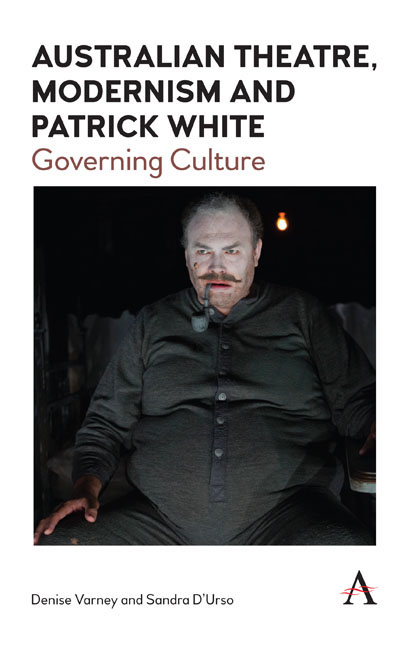Book contents
- Frontmatter
- Contents
- List of Illustrations
- Acknowledgements
- Introduction
- 1 The Archive, Governance and Sovereignty
- 2 ‘Words Fail Me’: The Ham Funeral and the 1962 Adelaide Festival
- 3 Night on Bald Mountain and the 1964 Adelaide Festival
- 4 The ‘Clowns’ Who ‘Cling to the Past’: A Sovereign Decision and the Practice of Exclusion
- 5 The Sovereignty of the Plays and Opportunities for New Publics
- Index
4 - The ‘Clowns’ Who ‘Cling to the Past’: A Sovereign Decision and the Practice of Exclusion
Published online by Cambridge University Press: 29 May 2019
- Frontmatter
- Contents
- List of Illustrations
- Acknowledgements
- Introduction
- 1 The Archive, Governance and Sovereignty
- 2 ‘Words Fail Me’: The Ham Funeral and the 1962 Adelaide Festival
- 3 Night on Bald Mountain and the 1964 Adelaide Festival
- 4 The ‘Clowns’ Who ‘Cling to the Past’: A Sovereign Decision and the Practice of Exclusion
- 5 The Sovereignty of the Plays and Opportunities for New Publics
- Index
Summary
As we saw in Chapters 2 and 3, the Governors rejected The Ham Funeral and Night on Bald Mountain; yet the plays were not passive objects. They had the power to create affects of disgust and anger in some, notably Glen McBride and Neil Hutchison, and joy and enthusiasm in others, such as Harry Medlin, Geoffrey Dutton and Max Harris. Reaching beyond the field of politics, Carl Schmitt recognizes the power of theatre when he ascribes something akin to sovereignty to the lifeworld of plays. He writes:
The play has its own sphere and creates a space for itself within which a certain freedom is maintained both from the literary material as well as from the originating situation.
Here he theorizes, in a manner akin to modern theatre studies, that the live theatre event exceeds the domains of both the Governors and the play text. This view adds a further layer to the Governors’ disdain. If they intuited that the play constituted a lifeworld, then they had good reason to consider it a challenge to their authority. In a further tract about the theatre as a selfcontained world of play, which is yet another dimension pertaining to the onstage action, Schmitt advances a thesis that a play is free from the tyranny of not only its literary origins but also the figure of the author himself. Schmitt's view anticipates debates in theatre studies many decades later that would pit fidelity to the play text against the director's autonomy, and it accounts for the rows between Patrick White and theatre director John Tasker, over the stage interpretation of the plays. This scenario reveals that White, the living playwright, had his own struggles not only with the Governors over the rejection of the plays but also with the will of the director over the staging. White made certain concessions to Tasker, such as agreeing to shift the time frame of The Ham Funeral from 1947 to 1919, but held fast to the originating situation of the play in other matters. This was especially so because many of the characters in White's plays were based on people he knew. To his mind, the author – not the producers or the directors – was sovereign.
- Type
- Chapter
- Information
- Australian Theatre, Modernism and Patrick WhiteGoverning Culture, pp. 85 - 104Publisher: Anthem PressPrint publication year: 2018

